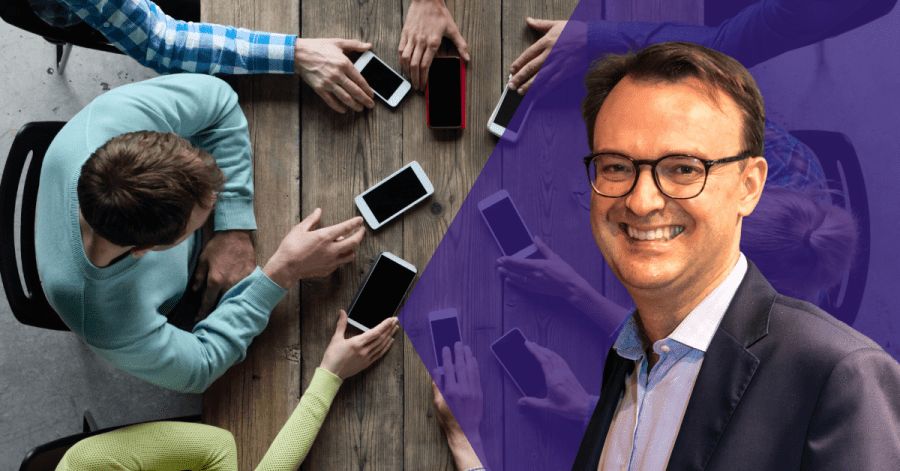“The people who will succeed in this field will be those who do it with their guts and with the willingness to make something more than money,” Augustin Becquet tells me. He is the CEO of Recommerce Group, a pioneer circular economy business in Europe working on buyback, refurbishments, and sales of high-tech products, starting with smartphones.
Headquartered in France, Recommerce has also been present in the Romanian market since 2021, when they acquired Romanian marketplace for refurbished smartphones, Fenix.eco. Here, the company partners with various players including retailers and telco businesses, and aims to get to 10% market share and €10M revenue in the following years.
Circularity is an increasingly popular business model for companies looking at long-term profitability and growth. Barriers such as low consumer awareness, lack of technical knowledge and skills, and higher initial investment are quickly fading, as markets mature.
Today, in a conversation with Augustin Becquet, we peel the layers of a circular economy business model, focusing on what makes it profitable, the important of quality and warranty for consumers, how external factors such as legislation facilitate the transition to circularity, and what we can learn from mature markets such as France.
President of the European Refurbishment Association EUREFAS, Augustin also touches upon the need to create generic spare parts to further drive circularity in the electronics market and explains why the circular economy does not threaten product innovation.
The Recursive: Recommerce is one of the European leaders in the refurbished smartphones market. What lessons would you share with entrepreneurs on building a profitable circular economy business?
Augustin Becquet, CEO Recommerce Group: It’s a difficult business in the sense that you acquire a lot of different devices, in different conditions – some are working, some are not. So you have a lot of diversity to handle and manage. As an entrepreneur, don’t get into this business to make money. This should not be your first aim. The first aim should be the willingness to change the world by bringing a positive impact. The people who will succeed in this field will be those who do it with their guts and with the willingness to make something more than money.
I would also recommend attracting large partners on your side. Because they will have more resources than a small startup, they will help you raise awareness and push new business models. As a second tip, focus on the quality and warranty of the product or service to gain confidence from the end consumer. At the end of the day, the consumer will be the one to create the market and ensure there is positive word-of-mouth for your product or service. Because circularity always existed in a sense – we are used to giving away or reselling things between friends and families. But what we can offer as an extra incentive is an additional layer of confidence, which in electronics translates to quality and warranty for the product. Then, you also need to master anything related to optimization. Today, optimization relies heavily on getting the right data. You should not shy away from investing in the right tools to help you optimize the business.
Specifically, what makes the circular model for electronic devices financially viable?
We have received fantastic help in our business through the Margin VAT scheme. It works like this: if I’m buying back a device from an individual consumer for €200 and I’m reselling it for €300, I pay the VAT only on the €100 that is invested in refurbishing the device. This is key to having a sustainable local business in Europe. If I’m buying a device in Romania and reselling it in Germany, for instance, that works as well. So we have this Pan-European scheme, which enables us to create strong circular economy businesses in the EU.
A second thing is what I call the generic spare parts and the right to repair. In the spirit of the circular economy, the first thing to do is to use devices for longer. Then there is refurbishing and then recycling, where you can only recover around 15% of the original product. Most of the raw material you cannot reuse because it’s too small or stuck. Today, our main challenge is that spare parts are either not available, or too expensive. Consequently, we’re not able to repair as many devices as possible. This is why at the European Association of Refurbishment, we’re calling for generic spare parts a bit like generic drugs. 25 years ago, the European Union decided to stop the labs that were building a monopoly on some drugs and make them generally available instead to decrease the price of drugs. We should do the same here: get generic spare parts to save more electronic devices.
How would generic spare parts and then the broader circular economy approach affect manufacturers?
There are many positive aspects for manufacturers. First, for big home electronic products like fridges, manufacturers need to have spare parts for around 10 years. If you launch 20-30 new products or even hundreds of products per year, it’s a lot of spare parts to keep for a super long time, right? So if you have this obligation on one side, and there are no generic spare parts, you probably bear all the cost and the management efforts. That’s why I think there could be a big interest for manufacturers in generic spare parts.
Second, the higher the repairability of a device, the higher its residual value. When I buy a car that I can repair easily and that will still be working in 20 years, if I’m selling my car after five years instead, the value I can get is probably higher. And so as a brand, you can ask for a premium when you’re selling a more durable and reliable car. Take the example of Mercedes; they can sell their cars at a 10-20% premium versus other brands because they have this reliability story behind them.
From a more philosophical standpoint, the circular economy does not imply that new is bad. At Recommerce, we don’t want to discourage innovation – we still need it. So we’re not positioning ourselves as competitors of manufacturers. What we want to do is use resources in the most optimized way. In society, we have this huge challenge in that we treat resources as if they were unlimited. We are pushing for unlimited data plans, unlimited music, and all-you-can-eat food. This is not the reality. The reality is that we live in a world with limited resources, so we need to manage them most efficiently.
How has the circular economy market evolved in Europe in the last two years? What have been the driving factors, and what is still missing?
The overall market is growing at 15% to 20% and we expect it to continue growing at this rate. In 2022, the growth was slower because of the overall macroeconomics. Customers are moving from new to refurbished devices for better prices, but it’s not the only consideration. Today, many people are trying to reduce their environmental impact.
Focus on the refurbished smartphones business, this alone is a more than €7 billion market in Europe. A big market that is also very fragmented. There are a lot of small players, operating local shops. We expect to see the market getting more professional through consolidation. We think a few players will remain to play at scale, because it is a business model with a low margin and reducing costs is important.
Some markets are more mature than others, especially the UK, Germany, and France. But all other markets are catching up fast. In a recent study we conducted in 9 markets, we learned that Romanian people are the most willing to consider buying refurbished devices in Europe.
What makes France one of the leaders in advancing the circular economy in Europe?
Firstly, we have done a fantastic job in pushing this agenda at the public administration level. When Recommerce was created in 2009, we quickly set up an association that helped us to do positive lobbying towards politicians. Just an example, according to French law, the public administration has to buy 20% of their devices refurbished. They have a fantastic understanding of all the benefits of the circular economy: it’s good for the planet, for individuals because we’re giving money back, and for society, because it is creating jobs.
Furthermore, France has big local companies like Telco with a solid understanding of their impact on the planet. Once this is achieved, they can start taking action to reduce their impact. Telco has seen the need to create green networks in the smartphone market. 80% of our impact in the smartphone market comes from hardware because, beyond the data, you have servers and computers. So if you can reduce the consumption of hardware, that’s where you have the most impact. And then for sure, if you can reduce the use of data, you would need fewer servers, hence further reducing impact.
What was 2022 like for Recommerce? And then zooming in on Romania, what has been the company’s traction in the local market in the past year, and what have been the driving factors?
2022 was not fantastic for the market, however, Recommerce grew by 30%. It was a strong year for us because we executed the strategy well and we expanded into more countries. We just launched in Spain and Italy, so now we have a local presence in 9 markets in Europe. We continue to gain more buyback programs and resell to more channels. So it’s a very dynamic business model.
We are also happy with the business performance in Romania. What makes us different from other players is our partnership approach. We partner with big companies in telco, such as Orange, and in retail, such as Carrefour, and we enable them to build a circular business. What we want to do now is to accelerate the buyback programs. Hopefully, in the next couple of weeks, we can disclose new such programs in Romania.
What comes next for Recommerce in terms of growth?
We want to continue to do buyback in more categories. We started with one channel – telco, and one product – smartphones, but now we are partnering with more channels from retailers to B2B and C2C like Olx in Romania. We started with high tech and want to do very well here first, and after a few years we want to go into new segments, like the mobility sector. We also only cover 9 markets in Europe so we have room to expand and build locally. The refurbished smartphone business alone is worth more than €7 billion business in Europe, out of which we are capturing €125 million, a decent size of business, but we have room to grow and the market is growing, too.
How do you define leadership, and what practices have helped you in your role as CEO of Recommerce?
My approach and that of our manager is leading by example. It’s a very positive way to ensure that there is respect and understanding, openness, accessibility, and freedom of speech. In our culture, the boss can be wrong, so you should challenge the boss. It’s an obligation, if you’re not doing it, you’re not doing your job. Always with a lot of respect, and benevolence, so that everything goes smoothly. Then you always have tension in a company, you always have a bit of politics. So, my role is to try to ensure that tension is minimized and that people are comfortable and experience fair treatment. We want to offer a safe harbour for people. Accountability is also important in our culture. As a leader, I am responsible for both the good and the bad.
My sources of inspiration are not the usual guys, the Elon Musks of the world. It’s the people I have worked with in my career of more than 20 years now and have left a mark. In 20 years, I’ve seen my share of good managers.
What are the tech trends that you’re following this year that you think will make a difference in your business?
We’re investing a lot in data management, this is one of our core competencies. Data is running all over our business. For instance, we need to offer the right pricing to the end consumer for any device, of any shape or condition. Because if the price is too high or too low, we’re going to lose money. This is a science where we need to be very precise. And again, we are in a business with a thin margin, so we need to optimize everything.








